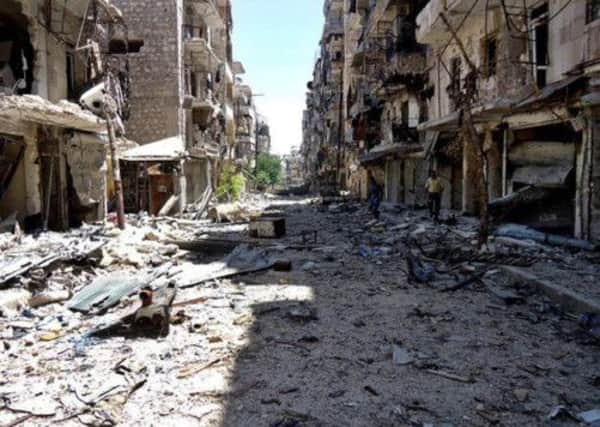Syria: Israeli doctors treat over 100 injured


However, for the last four months, doctors in the Jewish state have been quietly offering treatment to Syrians.
More than 100 people have been treated by Israeli doctors, 33 of them at the Ziv hospital in Safed, after being referred by a new army medical facility at the Syrian border, according to Ziv hospital director Oscar Embon.
Advertisement
Hide AdAdvertisement
Hide AdAmong the recent arrivals was a 15-year-old boy who was wounded by shrapnel while working on a tractor. He was taken by an Israeli army ambulance with a blood-stained referral note in Arabic summarising his treatment in Syria.
Dr Embon and the medical staff are highly motivated to help their Syrian patients. However, some Israelis believe that given the magnitude of the tragedy next door and its impact on neighbouring Jordan, Turkey and Lebanon, Israel should beef up the medical effort while making an offer of haven to Syrian refugees.
Israeli defence minister Moshe Yaalon has ruled out establishing refugee camps for Syrians, and an army spokesman declined to answer a query on whether Israeli troops have turned away Syrian refugees.
Dr Embon says the medical effort is making a difference: “This is a very cruel war. It is, however, a source of satisfaction and pride that we can realise the values of our profession to cross borders, be humanistic, treat those in need and help others.”
More than 100,000 people have died in the two-and-a-half year old conflict in Syria. Israel’s policy is that it is not involved in the fighting between president Bashar al-Assad’s regime and opposition forces.
It has, nevertheless, conducted several airstrikes in Syria believed to have targeted weaponry that was bound for its enemy the Lebanese Hezbollah organisation which is fighting beside Mr Assad’s army. Syria accuses Israel of siding with the rebels.
When Syrian patients first started coming to Ziv, they tended to be “rebels who were involved in the war,” Dr Embon said. “But now it’s simple citizens. There are shellings of innocent civilians and a share of them seek care in Israel.”
One Syrian patient refused to eat the hospital food on the grounds that it was not in conformity with Islamic dietary requirements, Dr Embon said. “Our person told him that everything is kosher here and that we are even stricter than halal and that there will be no pork,” he said.
Advertisement
Hide AdAdvertisement
Hide AdAmram Hadary, head of the hospital’s trauma unit, said that in many instances the Syrian patients do not know exactly what caused their injuries. “We always try to understand the mechanism of trauma, whether the explosion was in an open space or a closed space, whether the penetration was a bullet or fragment of shrapnel. A large share of them don’t know exactly what harmed them. They say there was an explosion but they don’t know what it was.”
Dr Hadary said that his Israeli patients normally receive follow-up care in outpatient clinics and undergo a supervised rehabilitation process. This is not the case with the Syrians, who are sent back to their country without the Israeli doctors having a clear picture of the follow-up options there.
Yossi Alpher, former director of the Jaffee Centre for Strategic Studies, said Israel limits its humanitarian help so as not to give the Assad regime more ammunition to accuse it of taking sides in the war. “The idea is to do the minimum that human morality demands from us as neighbours but not to be seen as the medical corps of the rebels.”
However, the former director-general of the foreign ministry, Alon Liel, says this is not enough. “Israel can do more. We should announce that refugees who feel endangered are welcome and allocate space in the Golan Heights for them. We should also give people who need further medical treatment the option of coming again. This is the minimum Israel should do.”
Assad takes bullish view of long military campaign
Syrian president Bashar al-Assad has said he and his government would survive the civil war having endured everything his opponents could do to topple him and only the distant prospect of direct foreign military intervention could change that.
After steady rebel gains in the first two years of civil war, Syria became stuck in a bloody stalemate lasting months until a June government offensive that led to the capture of a strategic border town. Momentum now looks to be behind Mr Assad.
“This was their goal in hitting our infrastructure, hitting our economy, and creating complete chaos in society so that we would become a failed state,” Mr Assad said in an interview with Syria’s official Thawra newspaper published yesterday.
“So far we have not reached that stage.”
The only factor that could undermine the resilience of the government, he said, was direct foreign intervention. However, he said that was a unlikely due to foreign powers’ conflicting views of an opposition movement increasingly overtaken by radical Islamist militants.
Advertisement
Hide AdAdvertisement
Hide Ad“They have used every material, emotional and psychological means available to them. The only option they have is direct foreign intervention,” he said.
“But there is hesitation and rejection (of intervention) from most countries so if we can overcome this stage with resoluteness and awareness, we have nothing more to fear.”
The rebels remain strong in the north of Syria, but Mr Assad has been slowly reinforcing his forces there in the hope of retaking territory.